Search
Search Results

Definition
Seven Lucky Gods
In Japanese folklore the Shichifukujin are the Seven Lucky Gods who may also be known as the Seven Gods of Happiness or the Seven Gods of Good Fortune. The seven gods are in fact of diverse origin as some are originally from Buddhism, some...

Definition
Meiji Restoration
The Meiji Restoration was a political event that took place in Japan in 1868. In it, the Tokugawa family, a warrior clan that had ruled Japan for more than 260 years, was overthrown by a group of political activists who proclaimed that their...
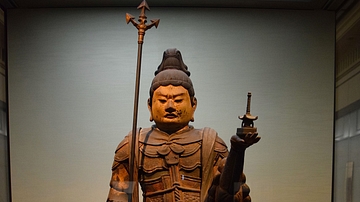
Image
Japanese Bishamon Ten Scuplture
Made of wood with polychrome, cut gold leaf, and crystal eyes, this is one of the most remarkable statues from ancient Japan. The ink inscription eclosed in the statue of Bishamon Ten (Vaisravana) reveals that it was dedicated on the seventh...
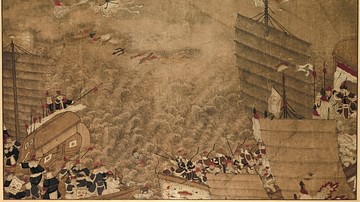
Definition
Wako - The Medieval Pirates of Southeast Asia
Wako (aka wokou and waegu) is a term used to refer to Japanese (but also including Chinese, Korean, and Portuguese) pirates who plagued the seas of East Asia from Korea to Indonesia, especially between the 13th and 17th centuries CE. Besides...
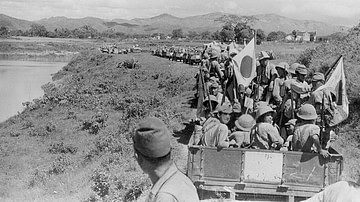
Image
Japanese Troops Enter French Indochina, 1940
Japanese troops enter French Indochina and head towards Lang Son in what is northern Vietnam today. During 1940, Japan began to encroach on French Indochina so that they could cut off the supplies that were routed through the area and into...
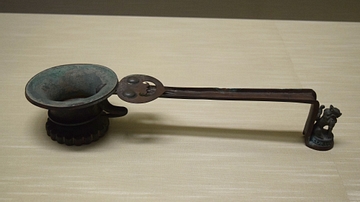
Image
Ancient Japanese Incense Burner
This ancient Japanese incense burner has a lion-shaped weight at the end of its handle. It was cast in bronze and dates from the 8th century CE during the Nara period in Japanese history. (Tokyo National Museum)
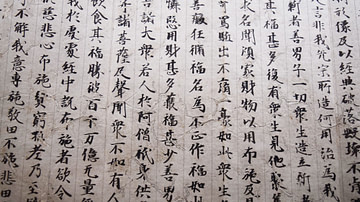
Image
Portion of a Japanese Buddhist Sutra
This is a portion of the "Bussetsu zoho ketsugi kyo," which was a sutra copied by hand in ink on paper in 12th-century CE Japan. (Tokyo National Museum)
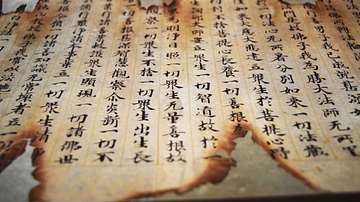
Image
Section of the Japanese Flower Garland Sutra
This is one of 60 scrolls from a transcription of the "Avatamsaka Sutra." Ruled lines in gold pigment segment the paper, which is decorated with flakes of god. At some point, the top and bottom of this scroll were burnt in a fire with the...

Video
Japanese Mythology: Izanagi and Izanami
The creation story of Japan illustrated with Japanese Art. This video describes the birth of the gods Izanagi, Izamani, Amaterasu, Tsukuyomi, and Takehaya Susanoo, and why the emperor is believed to be divine.

Interview
Interview: Pre-Raphaelites: Modern Renaissance
Pre-Raphaelites: Modern Renaissance marks the first multidisciplinary exhibition in Italy to examine the profound impact of Italian Renaissance art on the Pre-Raphaelite movement, which flourished in Victorian and Edwardian Britain (c. 1840-1920...